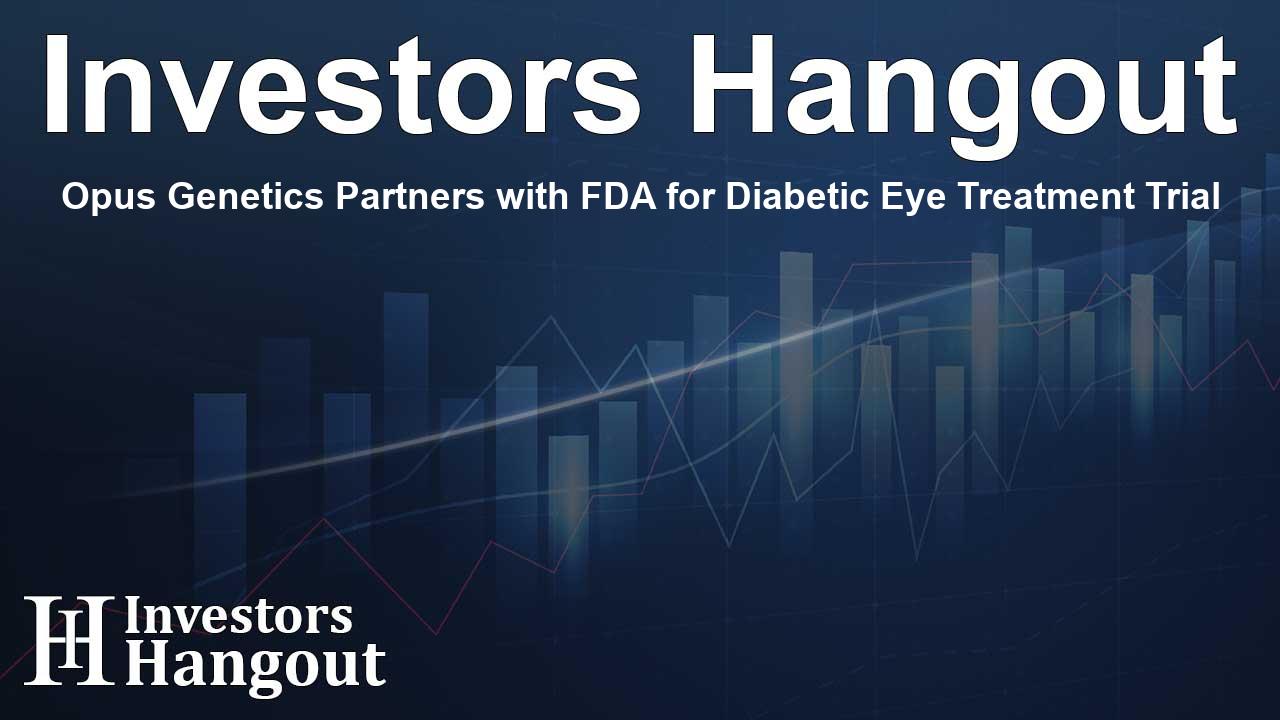Opus Genetics Partners with FDA for Diabetic Eye Treatment Trial

Opus Genetics Collaborates with FDA for Phase 3 Trial
Opus Genetics, Inc. (NASDAQ: IRD) is making significant strides in ophthalmic treatments, focusing on addressing diabetic retinopathy, a prevalent condition that leads to severe visual impairment. This biotech firm recently announced that it has aligned with the U.S. Food and Drug Administration (FDA) to initiate a Phase 3 clinical trial of its innovative drug, APX3330. With a market capitalization of $26.2 million, this development is crucial, especially considering the 25% stock decline in the past week, which indicates the market's volatility.
Significance of Phase 3 Clinical Trial
The Special Protocol Assessment (SPA) agreement with the FDA signifies an important milestone for Opus Genetics. This SPA affirms that the design of their Phase 3 trial, aiming to evaluate the effectiveness of APX3330, meets the necessary benchmarks for a New Drug Application if positive results are obtained and thoroughly vetted.
Understanding APX3330 and Its Mechanism
APX3330 is designed to combat moderate to severe non-proliferative diabetic retinopathy (NPDR), a condition affecting millions of patients in the U.S. alone. This drug has successfully passed through 12 clinical trials and works by inhibiting Ref-1, a significant regulator of transcription factors. This action is anticipated to reduce angiogenesis, oxidative stress, and inflammation—common complications experienced by patients suffering from ocular diseases.
Leadership Insights on Future Prospects
Under the leadership of CEO George Magrath, Opus Genetics is keen on leveraging this opportunity. The company recognizes APX3330 as a potentially transformative option for NPDR patients and is actively seeking partnerships to further fund the development of their promising therapies. The commitment extends beyond diabetic retinopathy as Opus Genetics continues to advance various gene therapy candidates for inherited retinal diseases.
Company's Diverse Pipeline of Therapies
Opus Genetics has an extensive pipeline of gene therapies targeting several conditions, such as bestrophinopathy and retinitis pigmentosa, among others. A notable mention is the upcoming Phase 1/2 study planned for their BEST1 gene therapy, anticipated to kick off in 2025. In addition, the company is progressing with its Phentolamine Ophthalmic Solution 0.75%, which is currently in Phase 3 trials aimed at addressing presbyopia and improving vision in low-light environments.
Market Outlook and Analyst Perspectives
Despite facing challenges, such as a current negative earnings per share of $1.09, analysts are optimistic about Opus Genetics' future. Pricing targets set by analysts range from $8 to $15, hinting at significant upside potential for the company's stock. Recently, H.C. Wainwright assigned a Buy rating to Opus Genetics, emphasizing the promising features of its inherited retinal disease platform and the catalysts expected in 2025.
Future Developments Following Merger
In a strategic move, Ocuphire Pharma has acquired Opus Genetics through an all-stock transaction, creating a new entity with an even greater focus on treating inherited retinal conditions. This merger enriches their existing pipeline, including advancements for both the OPGx-LCA5 gene therapy candidate and the Phentolamine solution.
Commitment to Advancing Eye Condition Treatments
Ocuphire Pharma's recent accomplishments, particularly positive outcomes from pivotal Phase 3 clinical trials on RYZUMVI, demonstrate a robust dedication to enhancing ocular health. Furthermore, the company has commenced the VEGA-3 and LYNX-2 Phase 3 trials, focusing on presbyopia and reduced visual acuity in dim lighting, respectively. Looking further ahead, the ZETA-2 Phase 2/3 trial for APX3330 is slated to start in 2025, showcasing the relentless pursuit of innovation in eye condition treatments.
Frequently Asked Questions
What is APX3330 designed to treat?
APX3330 is intended to treat moderate to severe non-proliferative diabetic retinopathy (NPDR), a common diabetic eye condition.
What milestone did Opus Genetics achieve with the FDA?
Opus Genetics secured a Special Protocol Assessment with the FDA for its Phase 3 clinical trial of APX3330.
What role does the CEO play in the company?
CEO George Magrath leads Opus Genetics and emphasizes the transformational potential of APX3330 for NPDR patients while seeking partnerships for development.
What is the significance of the company's pipeline?
The pipeline includes diverse gene therapy candidates targeting various retinal diseases, showing Opus Genetics' commitment to addressing complex ocular conditions.
How is the stock of Opus Genetics performing?
The stock has seen significant volatility, recently experiencing a decline of 25%, although analysts project potential upsides in the future.
About Investors Hangout
Investors Hangout is a leading online stock forum for financial discussion and learning, offering a wide range of free tools and resources. It draws in traders of all levels, who exchange market knowledge, investigate trading tactics, and keep an eye on industry developments in real time. Featuring financial articles, stock message boards, quotes, charts, company profiles, and live news updates. Through cooperative learning and a wealth of informational resources, it helps users from novices creating their first portfolios to experts honing their techniques. Join Investors Hangout today: https://investorshangout.com/
Disclaimer: The content of this article is solely for general informational purposes only; it does not represent legal, financial, or investment advice. Investors Hangout does not offer financial advice; the author is not a licensed financial advisor. Consult a qualified advisor before making any financial or investment decisions based on this article. The author's interpretation of publicly available data shapes the opinions presented here; as a result, they should not be taken as advice to purchase, sell, or hold any securities mentioned or any other investments. The author does not guarantee the accuracy, completeness, or timeliness of any material, providing it "as is." Information and market conditions may change; past performance is not indicative of future outcomes. If any of the material offered here is inaccurate, please contact us for corrections.